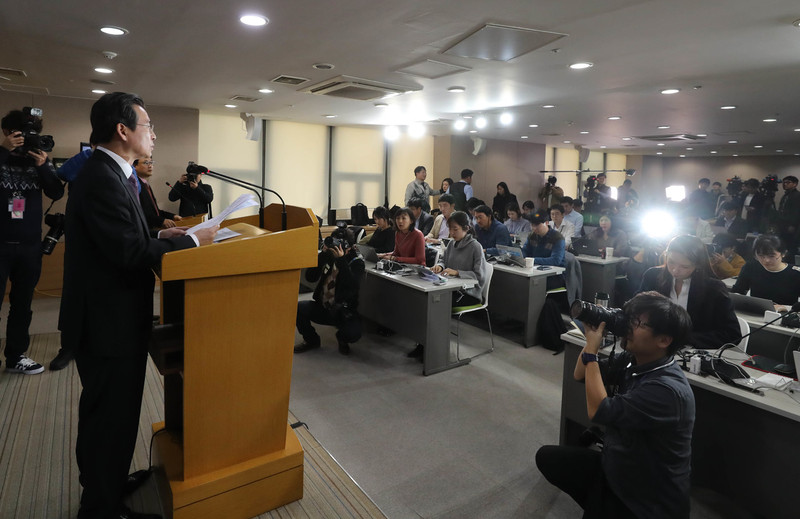Posted on : Nov.15,2018 20:24 KST
 |
|
Kim Yong-beom, vice chairman of the Financial Services Commission and chairman of the Securities and Futures Commission, announces the suspension of transactions of Samsung Biologics stock at the Central Government Complex in Seoul on Nov. 14. (Shin So-young, staff photographer)
|
On Nov. 14, the Securities and Futures Commission, which reports to the Financial Services Commission, accepted most of the findings of a second audit by the Financial Supervisory Service that concluded that Samsung BioLogics violated accounting rules. Regulators ultimately found that Samsung BioLogics’ accounting breach was deliberate.
It’s shocking and disappointing that such a thing could have happened at a key affiliate of the Samsung Group, which is the biggest player in the South Korean economy. Separately from the impending investigation and prosecution by the country’s judicial authorities, the company in question ought to feel great shame and responsibility for this.
The deliberate accounting fraud at Samsung BioLogics had already been partially recognized by the financial authorities back in July. But questions remained after the Securities and Futures Commission (SFC) postponed its decision on the key allegation in its audit, namely that Samsung Bio had unfairly inflated the value calculation of its subsidiary Samsung Bioepis.
It’s of no small significance that the second audit by the Financial Supervisory Service (FSS) culminated in this decision. This was a serious case of cooking the books, amounting to 4.5 trillion won (US$3.6 billion), and there will be major ramifications since the fraudulent accounting occurred at a leading company in the biotech industry that Samsung had tapped as a driver of future growth.
The inappropriate alteration of the value calculation for Bioepis occurred in 2015. As is widely known, Bioepis’s value shot up, bringing Samsung BioLogics into the black after four straight years in the red, with 1.9 trillion won (US$1.7 billion) in net profit for 2015. Naturally enough, what seemed like a miraculous act prompted suspicions. There is also evidence that accounting firms, which represent groups of experts, were involved in this process.
It’s deplorable to think that the very people who are responsible for monitoring the capital market were implicated in such impropriety. A fresh look should also be taken at the integrity of the financial regulators, who dragged their audit along for a year and nine months after the issue was first raised in Feb. 2017 by People’s Solidarity for Participatory Democracy.
The fraudulent accounting at Samsung BioLogics is particularly grave because it’s directly connected with efforts to help Samsung Electronics Vice Chairman Lee Jae-yong assume control of the Samsung Group. At the time of the merger between Cheil Industries and Samsung C&T in 2015, Lee Jae-yong was the largest shareholder of Cheil Industries (23.2%), and Cheil Industries held a 46% share in Samsung BioLogics.
This fuels allegations that the value of Samsung BioLogics was inflated to justify the merger and to aid Lee’s succession. That’s also one of the reasons we can’t help feeling doubts about the legitimacy of that succession. Another reason this is receiving attention is because it’s linked to the Supreme Court’s ruling about Lee Jae-yong’s role in the influence-peddling scandal involving former president Park Geun-hye and her confidante Choi Soon-sil.
Now that the prosecutors have been given the SFC’s decision, not only the company in question but also the staff at the accounting firms should be thoroughly investigated and held duly responsible. This is needed to underline the fact that fraudulent accounting is a grave financial crime and to prevent small-scale investors from suffering such losses again.
The Korea Exchange, which suspended trading of Samsung BioLogics stock as of Nov. 15, must now review whether the company should be delisted from the exchange. This is a heavy responsibility considering that the interests of more than 80,000 small investors are at stake. We hope that the Korea Exchange will conduct a principled review of this matter and treat this incident as an opportunity to restore order to the capital market.
Please direct comments or questions to [english@hani.co.kr]









